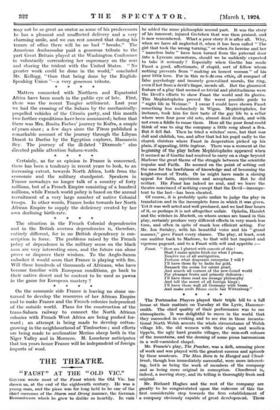THE THEATRE.
"FAUST" AT THE " OLD VIC."
GOETHE wrote most of the Faust which the Old Vic. has shown us, at the end of the eighteenth century. He was a young man, and the piece was for long held to be one of the chief successes of the Sturm and Drang manner, the German: Romanticism which he grew to dislike so heartily. In vain he added the more philosophic second part. It was the story of his innocent, injured Gretchen that was then praised, and
is now remembered. What a poor story it is after all.. Why, when we have all neglected it, when it has been called " The girl that took the wrong turning," or when its heroine and her " nameless babe " have been turned from the paternal door into a Lyceum snowstorm, should we be suddenly expected to take it seriously ? Especially when Goethe has made Faust a good, affectionate, if stupid, sort of fellow whom nothing prevents from " making an honest woman " of his
poor little love. For in this m At drama ethic, all compact of false psychology and insanely generalized morals, the ring, even if hot from a devil's finger, mends all. But the gloomiest feature of a play that seemed so trivial and platitudinous were the Devil's efforts to show Faust the world and its glories.
This Mephistopheles proved the worst possible guide to " night life in Weimar." I swear I could have shown Faust
something less melancholy in Wigan. Mephistopheles, for instance, took him for first taste of the gay life to a cellar where were four poor old sots; almost dead drunk, and with not even a fiddle to rouse- them. Here all the poor fiend could think of was to sing the company a little song about a flea. But it fell flat. Then he tried a witches' cave, but that was dull and childish, too, and after that led his pupil sadly to the church cloisters where Faust in desperation picked up his plain, if appealing, little ingenue. There was a moment at the beginning of the play before Mephistopheles appeared when it seemed as if Goethe had resolved to carry on a stage beyond Marlowe the great theme of the struggle between the scientific impulse and Faith. He seemed on the point of setting out the case for the lawfulness of knowledge and of becoming the knight-errant of Truth. Or he might have made a shining appeal for faith, mysticism and acceptance. But he did neither. His Faust has indeed no soul, and we leave the
theatre convinced of nothing except that the Devil—incompe- tent to the last—has been cheated.
Of course, it is probably quite unfair to judge the play in translation and in the incomplete form in which it was given.
Yet it was well acted- and well-produced, and we had four hours of it, so perhaps it is not altogether unfair. Ophelia, Hamlet
and the witches in Macbeth, on whom scenes are based in this play, certainly produce very different effects in very much less time, and often in spite of much less efficient acting. For Mr. Ion Swinley, with his beautiful voice and his " grand manner," gave Faust every chance. The play, at least, sent
one auditor back to Marlowe, to that wild but inspired and vigorous pageant, and to a Faust with will and appetite :—
Faust. "How am I glutted with conceit of this I
Shall I make spirits fetch me what I please, Resolve me of all ambiguities, Perform what desperate enterprise I will ?
I'll have them fly to India for gold, Ransack the ocean for orient pearl, And search all corners of the new-found world For pleasant fruits and princely delicate, ; I'll have them read me strange philosophy And tell the secret of all foreign kings ;
I'll have them wall all Germany with,- braes,
And make swift-Rhine-circle fan Wittenberg."
* * * *










































 Previous page
Previous page